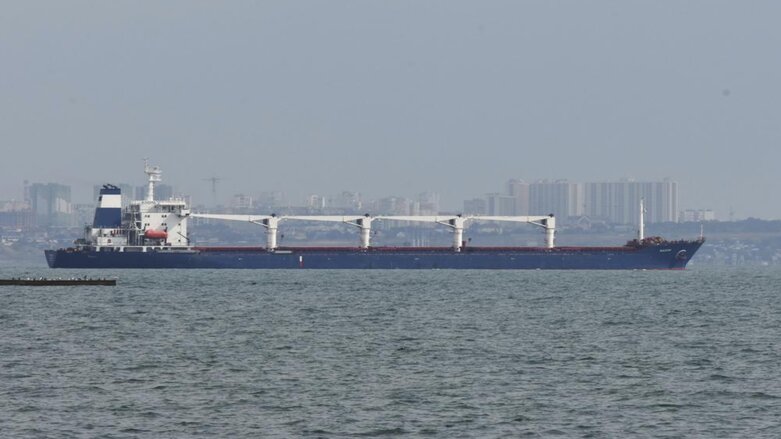First shipment of Ukrainian grain arrives in Istanbul; bound for Tripoli, amid food crisis in Lebanon

WASHINGTON DC (Kurdistan 24) – The first ship carrying grain from Ukraine arrived in Istanbul late on Tuesday. It is bound for Lebanon's northern port city of Tripoli to alleviate an impending food crisis in that country.
The release of the ship and its cargo is occurring under the terms of the agreement reached on July 22 between Ukraine and Russia, which was brokered in Istanbul by the United Nations and Turkey.
Lebanese Government Fails to Maintain Food Supplies for Population
Some 80% of Lebanon's wheat comes from Ukraine and Russia. Russia's invasion of Ukraine and the halt to shipping in the Black Sea has created a severe problem, much exacerbated by the explosions in the port of Beirut two years ago that destroyed numerous facilities, including grain silos.
The explosions were caused by the storage of some 2,750 tons of ammonium nitrate that was long left in a warehouse. The Lebanese government is now "desperately trying to secure sources of wheat," CNBC reported last Wednesday.
Four days later, on Sunday, the situation grew worse. A "weekslong fire, triggered by grains that had fermented and ignited in the summer heat," and it caused the collapse of yet more storage facilities, as The Washington Post reported.
"The 50-year-old, 48 meter (157 feet) tall silos had withstood the force of the explosion two years ago," the Post said, but "in July a fire broke out in the northern block of the silos due to the fermenting grains" and "firefighters and Lebanese Army soldiers were unable to put it out."
The fire "smoldered for weeks," resulting in Sunday's blast and the collapse of additional grain silos in Beirut's port, the Post explained.
Will Russia Allow Continued Grain Shipments?
Syria and Iran, both allies of Russia, dominate Lebanese politics. Notably, the first ship with grain to leave Ukraine is headed for Lebanon, which is in dire need of the shipment. Russia's agreement to the shipment, thus, serves the interests of its two most important Middle Eastern allies.
It remains to be seen, however, whether Moscow will be so accommodating in facilitating grain shipments to other countries.
Ukraine is deeply mistrustful of Russian intentions. President Volodymyr Zelensky hailed the first gain shipment, affirming that it should be a precedent for further exports on a regular basis. But Zelensky also accused Moscow of manipulating food supplies, using "the supply of wheat, corn, oil as a weapon."
"Russia creates a deficit, plays to raise prices, and when this provokes social unrest, it demands political concessions," the Ukrainian president warned.
Big Boost for Erdogan
Geography and events have conspired to give Turkey and its president, Recep Tayyip Erdogan, an unprecedented standing on the world stage he has long sought.
Read More: Russian-Ukraine war boosts Turkish leverage
Turkey is playing a crucial role in moderating the Ukraine crisis. It controls the Dardanelles Strait, which, in turn, controls transit into and out of the Black Sea: i.e., to and from all of Ukraine's ports.
Erdogan has also managed to maintain working relations with the two key parties: Zelensky and Russian President Vladimir Putin. In fact, he will meet with Putin on Friday at Russia's resort city of Sochi on the Black Sea.
Hovering in the background of the Ukraine crisis are the two World Wars of the twentieth century, both of which broke out over conflict in central Europe.
The casualties in those wars are truly mind-boggling. Some 20 million people died in World War I—roughly evenly divided between military and civilians. Some 75 million people died in World War II, roughly two-thirds were civilians.
Those terrible events are in the minds of senior figures, like US President Joe Biden, as they grapple with how to respond to Putin's unexpected and unprovoked aggression against Ukraine.
With the 1991 collapse of the Soviet Union, it was widely thought that conflict among western powers had ended. It was only "rogues"—figures like Saddam Hussein—who would engage in such aggressive actions. Putin, however, has proven that wrong.
The casualties in each of the two world wars dwarf any sacrifices that have been asked of the current generation. Yet without those sacrifices, many peoples, particularly those in the West, would not lead such comfortable lives, including the freedom and democracy they enjoy today. Depending on the course of events, the question may emerge: Are they also, like those before them, prepared to make significant sacrifices to pass on their good life to the generation that follows them?
One cannot overstate the centrality of the Ukraine crisis to the concerns of Western leaders. As the editors of The Washington Post recently wrote, "The top global priority for the United States now is Russia’s war in Ukraine and its accompanying fallout in global food and energy markets."
And that has broad repercussions throughout the world, including for the Middle East.
